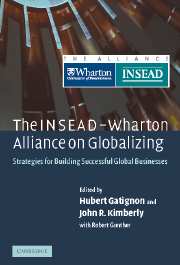Book contents
- Frontmatter
- Contents
- List of figures
- List of tables
- Notes on contributors
- Foreword
- Acknowledgments
- 1 Globalization and its challenges
- Part I Leading the global organization
- Part II Global market participation
- 6 Globalization through acquisitions and alliances: an evolutionary perspective
- 7 Developing new products and services for the global market
- 8 Managing brands in global markets
- 9 Global marketing of new products
- 10 Global equity capital markets for emerging growth firms: patterns, drivers, and implications for the globalizing entrepreneur
- Part III Managing risk and uncertainty
- Part IV Implications and conclusions
- Author index
- Subject index
10 - Global equity capital markets for emerging growth firms: patterns, drivers, and implications for the globalizing entrepreneur
from Part II - Global market participation
Published online by Cambridge University Press: 14 January 2010
- Frontmatter
- Contents
- List of figures
- List of tables
- Notes on contributors
- Foreword
- Acknowledgments
- 1 Globalization and its challenges
- Part I Leading the global organization
- Part II Global market participation
- 6 Globalization through acquisitions and alliances: an evolutionary perspective
- 7 Developing new products and services for the global market
- 8 Managing brands in global markets
- 9 Global marketing of new products
- 10 Global equity capital markets for emerging growth firms: patterns, drivers, and implications for the globalizing entrepreneur
- Part III Managing risk and uncertainty
- Part IV Implications and conclusions
- Author index
- Subject index
Summary
The expansion and development of global financial markets has led to a rapid rise in foreign IPOs and listings. As the opportunities for financing ventures have increased significantly, so has the complexity of decisions facing entrepreneurs and others who need to tap into these markets. When equity can be sourced virtually anywhere in the world, how do managers make decisions about listing a German firm on the Neuer Markt, Nasdaq, or both? The authors draw upon academic literature and their own research on foreign IPOs on US and German exchanges, as well as interviews with senior executives at firms that chose to list on a foreign exchange. This chapter summarizes some of the key benefits that attract companies to list on foreign exchanges, including gaining access to capital, offering liquidity to existing investors, enhancing the company's reputation at home and abroad, providing currency for acquisitions in the foreign country, offering exit opportunities, dispersing ownership geographically, and achieving a higher valuation. Against these benefits, they present a set of costs, including underpricing and dilution, direct costs of the IPO, reporting requirements, and recurring costs. By weighing these costs and benefits entrepreneurs can develop informed strategies for taking advantage of globalizing equity markets.
- Type
- Chapter
- Information
- The INSEAD-Wharton Alliance on GlobalizingStrategies for Building Successful Global Businesses, pp. 229 - 254Publisher: Cambridge University PressPrint publication year: 2004



